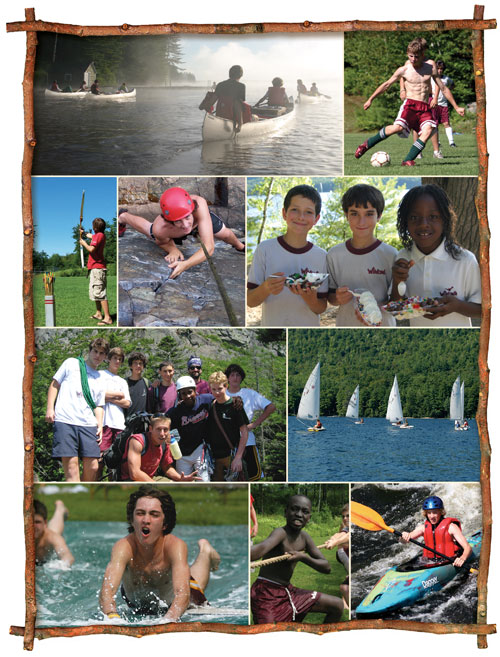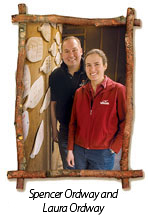The Winona Experience

Summer means more time to catch frogs, stage intricate plays or battles with neighborhood friends, or even take that much-anticipated, and sometimes dreaded, family vacation. Whatever summer means for any one child, it always means something new—a break from the busy routine of the school year. For many American boys and girls, camp is the highlight of summer. Each year, more than 300 boys ranging in ages from 7 to 15 find themselves at Winona Camps for Boys in Bridgton, Maine. And Michelle Sroka Ordway ’66 is there to welcome them.

In 1968 the Ordways were in the real-estate business in Maine when the camp came on the market. The previous owners, who founded Winona Camps in 1907, were looking to sell the land, but the sale came with one stipulation: the buyer must commit to operating the camp for at least one year. The Ordways were intrigued. But it was specifically the condition of the sale that tempted them. They knew if they bought this land, they would indeed keep it as a camp and do their best to continue its tradition. “We knew we were turning our lives in a different direction,” recalls Ordway. Though Al was a former Eagle Scout and grew up in the area, Michelle had little experience with camping. “I was a city girl, from Albany, New York. I went to French camp when I was about 12 with my sister Yvonne Sroka McCredie ’63, but I had no real exposure to camping in the general sense.” Michelle quickly found that knowledge of camping was not a prerequisite; rather, the desire to expose children to a love of learning and help boys become stronger physically and emotionally was most important. Buying the camp is a decision she has never regretted.
The campers’ days are filled with activities including hiking, horseback riding, kayaking, canoeing, sailing, baseball, lacrosse, tennis, soccer, archery, and more. But Ordway is quick to append that list with the assurance that though there may be much to fill the hours, a camper’s day is not overly scheduled. Every boy helps create his own schedule, which encourages him to make his own decisions. “At camp we want the child to learn about himself using the activity, not simply learn the activity. The children think they are just playing; they don’t see the invisible structure the counselors provide.” The counselors meet weekly and talk about every camper. (By the end of the first week, counselors are expected to know the name of each boy within their unit — close to 100 campers!) “Because we spend more time with our campers in the seven-and-a-half weeks than their parents or teachers may in prolonged periods of the school year, we are in a unique position to offer insight as to a boy’s character development and his changing interests,” says Ordway. They share information about who was crying in their bunk, who has completed a level of a particular activity, or who has become friends with whom. In turn, the camp director will share conversations with counselors he may have had with a boy’s family.

Running a camp is a year-round business. Fall, winter, and spring are spent tending to the facilities and grounds, hiring and training new counselors and staff—though about 90 percent of counselors and staff return for a second, third, or even tenth summer—and traveling up and down the East Coast to recruit campers. One recruitment goal is to provide a diverse experience for each camper. Ordway believes that it is important for “some inordinately privileged kids to learn to live with children for whom having food on the table is an issue.” To this end, Winona offers a substantial scholarship program, which includes partnerships with Emmaus House Episcopal Church of Atlanta, Georgia, and with the local Sudanese communities in southern Maine. This year, campers representing 32 states and 20 countries will spend their summer at Camp Winona.
At the start of summer, counselors and staff come to camp a week early to set up schedules and groups, train with psychologists in working with boys, and…choose the Bat. As with most camps Winona has its traditions. The most revered, known as the Bat, dates back to 1919. Throughout the summer a masked member of the staff will swoop through camp activities, and it is the campers’ job to chase it down and unveil it. “The Bat has never been caught — it has been jumped on and pummeled,” says Ordway. “On the last night of camp, the lights go out and the Bat is revealed. I always love to watch the junior campers who are amazed that they have been fooled, perhaps by their very own counselor.”
In 1988 counselor and former Winona camper Michael King was the Bat, sharing the duties that summer with Ordway’s son Spencer. King died in 2006, and the Ordway family was invited to the services. Al Ordway spoke at the funeral, and son Spencer recalls, “All the stories Mike’s brothers and sister told had to do with camp! This really brought home the impact camp can have on campers and staff.”

The strong nurturing environment at Winona Camps allows boys to flourish. While counselors facilitate the camper’s experience (the ratio of campers to counselors is four to one), really it is living 24 hours a day with other children that provides the special environment for developing community. By learning how to connect and communicate better through peer relationships, the boys can find greater connections within their own families, as well as at school and in other environments. “The friendships formed at Winona are ever-enduring because they are based on shared happy experiences in a world built just for boys,” says Ordway.
Many generations of families have spent summers at Winona. The Ordway family itself has risen through the ranks at camp. The Ordway children grew up in a home on the property, and while Spencer spent summers at Winona, Laura traveled down the pond to Winona’s sister camp, Camp Wyonegonic. “My childhood was simple and peaceful and fun and filled with love, but it’s more than that,” says Laura. “I grew up seeing my parents at work every day, how they interacted with campers and staff, and how others responded to them. It gave me true insight into who my mother and father are as people and how I should strive to walk in their footsteps, especially in regard to the respect and kindness they show to others.” Today both Spencer and Laura work for Winona and are raising their own children on the same land. Michelle Ordway says, “I cannot think of a life that would have been more interesting for me, better for raising children, better for a sense of community. Both Al and I feel we are doing something so important, yet done quietly in our corner of the world.”
Although nurturing boys and developing enriching learning experiences are crucial components of Winona Camps, “camp is always a lively atmosphere,” says Ordway—and don’t get her started on Banana Split Night. When summer hits, all 400 acres of Camp Winona fill up quickly with the sound of boys’ laughter, the smell of roasting marshmallows, and the warm glow of late-night campfires. That first summer 40 years ago, Ordway was busy not only adjusting to life at camp, but also life as a new mother, with six-month-old Spencer. She quickly inherited many more sons and continues to every summer.
100 Year of Friendships

Photo Credits: Spencer and Laura Ordway: Ralph Mercer. All else: Courtesy of Winona Camps for Boys
